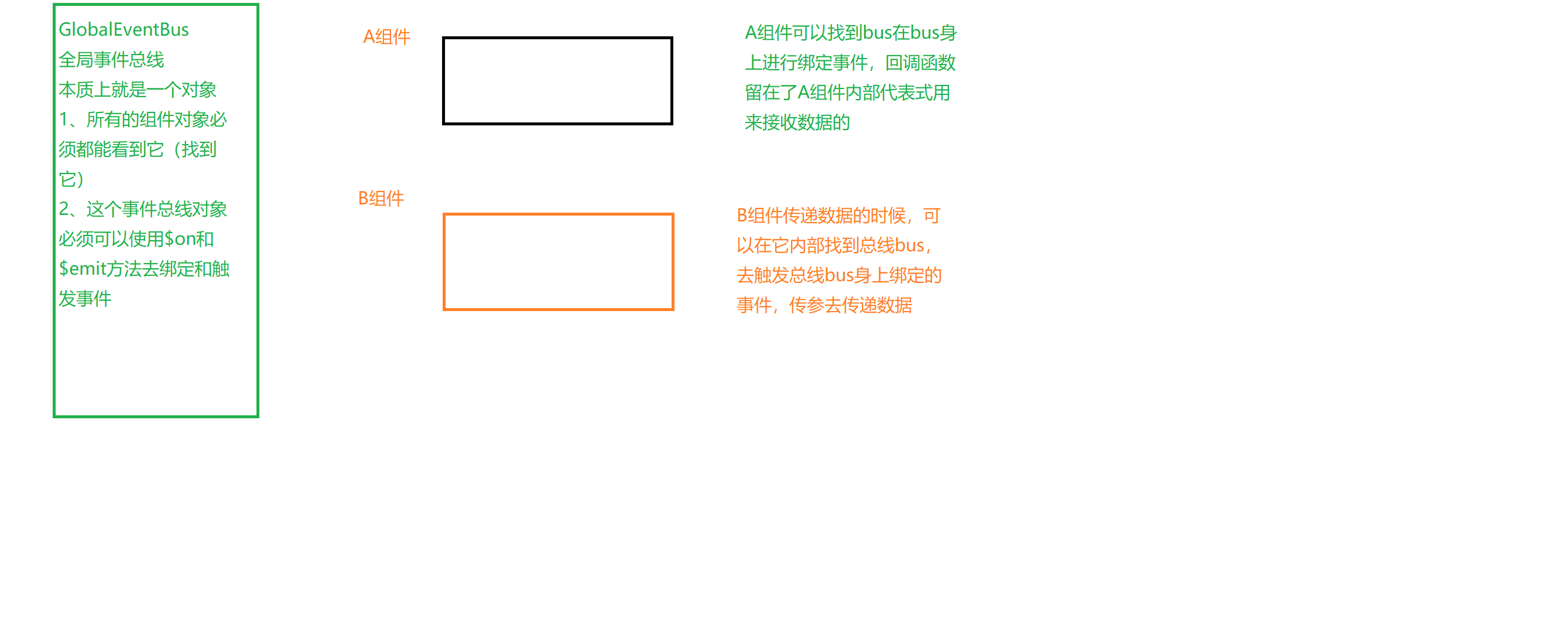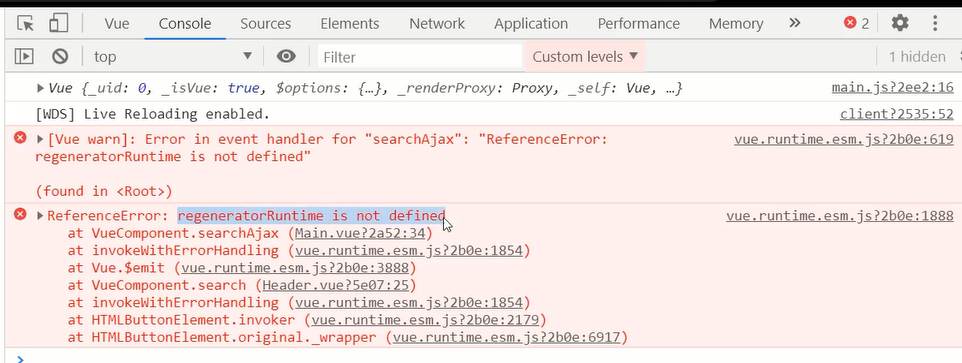全局事件总线原理图

通信方式 props
父子之间传递
父向子传递属性,通过属性把数据交给子组件
子向父传递数据,子组件通过调用父组件的行为函数,把数据当参数交给父组件
通信方式 全局事件总线(自定义事件是全局事件总线的基础)
vm对象和组件对象的关系
vm的原型对象 === 组件对象的原型对象的原型对象
本身自定义事件可以完成子父之间的传递,因为父组件中可以看到子组件,可以为子组件绑定事件,子组件中可以触发事件
但是如果不是子向父,那么其余的就没办法了,因为两个组件互相是看不到的,没办法再其中一个给另外一个绑定事件
此时我们可以借助中间人,也就是他们都可以同时看到的一个人,就是全局事件总线(所有的组件对象都能看到)
在接收数据的组件中,获取总线绑定事件
在发送数据的组件中,获取总线触发事件
全局事件总线说到底就是个对象,我们通常就是用vm对象作为全局事件总线使用
把vm对象添加到Vue原型对象 就形成全局事件总线(vm)
在main.js中设置全局事件总线
// new Vue()实例化了一个Vue的实例化对象
//因为只有组件对象或者Vue的实例化对象才能调用$on和$emit
//想要成为事件总线的条件:
//1、所有的组件对象必须都能看得到这个总线对象,因此我们把这个对象放在了Vue原型
//2、这个事件总线对象必须能调用$on和$emit方法(总线对象必须是Vue的实例化对象或者是组件对象)
new Vue({
beforeCreate(){
Vue.prototype.$bus = this
},
el:'#root',
render: h => h(App)
})
在父组件app中绑定事件
mounted(){
this.$bus.$on('updateOne',this.updateOne)
//跟新事件
this.$bus.$on("addTodo",this.addTodo)
//删除一个事件
this.$bus.$on("deleteOne",this.deleteOne)
//删除全部事件
this.$bus.$on("deleteAll",this.deleteAll)
//全选框,跟新所有的li状态
this.$bus.$on("updateAll", this.updateAll)
},
在子组件中触发事件,并且传递数据给父组件
addT(){
//回车之后干活
let {content} = this
if(content.trim()){
let id = Date.now()
let isOver = false
let todo = {
id,
content,
isOver
}
this.$bus.$emit('addTodo',todo)
二, 具名插槽,默认插槽, 作用域插槽
通信方式 slot插槽 一个组件会多次使用,但是不同场景下又有少部分结构数据会发生变化,(当然可以用不同的子组件) 那么就得通过父组件告诉子组件变化的内容是什么,此时就要用到这个插槽 子组件当中<slot></sloat>其实就是占位用的,让父元素给它填充内容,可以带标签
作用域插槽
子组件的slot可以通过 属性传递值给父组件,然后父组件可以根据不同需求改变这个slot内部的显示结构
把子组件的值,传给父组件固定的区域进行操作
默认不能有其它插槽,如果要有其它插槽,必须设置为具名插槽
App组件
<template> <div> <Child> <template slot="btn"> <button>点我</button> </template> <template slot="aa"> <a href="http://www.atguigu.com">点我去学习</a> </template> <template slot="ss"> <span>嘿嘿</span> </template> </Child> <Child> <template> <h2>我爱你</h2> </template> </Child> <Child2 :todos="todos"> <!-- 决定子组件内部的结构,比如假设isOver为true,那么内容需要包含在span当中并且内容前面带√ --> <!-- slot-scope会把子组件传递过来的数据,放在一个对象当中作为属性 --> <!-- 什么时候用作用域插槽: 当碰到数据是在子组件当中展示的,而结构是由父组件决定的,此时必然使用作用域插槽 --> <template slot-scope="scopePerps"> <span v-if="scopePerps.todo.isOver"> √ </span> {{scopePerps.todo.content}} </template> </Child2> </div> </template> <script> import Child from '@/components/Child' import Child2 from '@/components/Child2' export default { name: '', components:{ Child, Child2 }, data(){ return { todos:[ {id:1,content:'抽烟',isOver:false}, {id:2,content:'喝酒',isOver:true}, {id:3,content:'烫头',isOver:false} ] } }, } </script> <style scoped> </style>
Child1 组件
<template> <div> <h1>我爱你</h1> <!-- slot占位置,结构不确定,需要父组件传递 --> <slot name="btn"></slot> <slot name="aa"></slot> <slot name="ss"></slot> <!-- 默认插槽,没有名字的slot --> <slot name="btn"></slot> </div> </template> <script> export default { data() { return { }; }, }; </script> <style scoped > </style>
Childer2组件
<template> <div> <h1>我爱你赵丽颖</h1> <ul> <li v-for="(todo, index) in todos" :key="todo.id"> <slot :todo="todo"> <!-- 这个:todo="todo" 是作用域插槽的一部分,会传递给父组件当中固定的某个区域 --> <!-- {{todo.content}} --> </slot> </li> </ul> </div> </template> <script> export default { name: '', props:['todos'] } </script> <style scoped> </style>
二, 利用全局事件总线传递数据, 组件内发送请求,获取数据
main.js中设置全局事件总线
// 引入vue
import Vue from 'vue'
//引入app
import APP from '@/APP'
Vue.config.productionTip=false
new Vue({
beforeCreate() {
// 设置事件总线
Vue.prototype.$bus=this
},
el:"#root",
render:h=>h(APP)
})
app组件
<template> <div > <Header></Header> <Main></Main> </div> </template> <script> import Header from '@/components/Header' import Main from '@/components/Main' export default { data() { return {}; }, components:{ Header, Main, } }; </script> <style scoped ></style>
header组件
<template> <section class="jumbotron"> <h3 class="jumbotron-heading">Search Github Users</h3> <div> <input type="text" placeholder="enter the name you search" v-model="content" /> <button @click="sendSj">Search</button> </div> </section> </template> <script> export default { //在该组件中,需要将输入的数据传递给main,让main组件去发送请求,获取数据 //兄弟关系,需要用事件总线传递 name:"Header", data() { return { content:'', }; }, methods:{ sendSj(){ this.$bus.$emit('addO', this.content) } } }; </script> <style scoped></style>
main组件, 安装axios, 引入axios
<template> <div class="row"> <h2 v-if="isFirst">欢迎光临,请输入关键字进行搜索</h2> <h2 v-else-if="isLoading">正在搜索中,请稍后</h2> <h2 v-else-if="errMsg">请求出错:{{ errMsg }}</h2> <div v-else class="card" v-for="(user, index) in users" :key="user.id"> <a :href="user.url" target="_blank"> <img :src="user.imgUrl" style=" 100px" /> </a> <p class="card-text">{{user.name}}</p> </div> </div> </template> <script> // 引入axios import axios from "axios"; export default { //发送请求前,isFirst为fasle, isLoading为true //发送请求后,isLoading为false, name: "Main", data() { return { users: [], isFirst: true, isLoading: false, errMsg: "", }; }, //页面加载后获取header的数据 mounted() { this.$bus.$on("addO", this.addO); // this.addO() console.log(111) }, // #region // methods:{ // addO(q){ // //发送请求前,在搜索中 // this.isFirst= false // this.isLoading= true // axios({ // url:"https://api.github.com/search/users", // method:'get', // params:{ // q // } // }).then((res)=>{ // let newArray= res.data.items.map(item=>({name:item.login, url:item.url, imgUrl: item.avatar_url, id:item.id})) // // console.log(newArray) // this.users = newArray // //发送请求后,更改状态 // this.isLoading = false // }).catch((error)=>{ // console.log(error.message) // //发送请求有误,更改状态 // this.errMsg = error.message // this.isLoading = false // }) // } // } // #endregion methods: { // 接口2: https://api.github.com/search/users?q=aa //收到header组件的数据,并且去发送请求,获取数据 async addO(content) { //发送请求前,在搜索中 this.isFirst= false this.isLoading= true try { let result = await axios({ url: "https://api.github.com/search/users", method: "get", params: { q: content, }, }); //map计算一个新数组 let newAarry= result.data.items.map(item =>({name:item.login, url:item.url, imgUrl: item.avatar_url, id:item.id})) this.users = newAarry //发送请求后,更改状态 this.isLoading = false } catch (error) { console.log(error.message) //发送请求有误,更改状态 this.errMsg = error.message this.isLoading = false } }, }, }; </script> <style scoped> .card { float: left; width: 33.333%; padding: 0.75rem; margin-bottom: 2rem; border: 1px solid #efefef; text-align: center; } .card > img { margin-bottom: 0.75rem; border-radius: 100px; } .card-text { font-size: 85%; } </style>
注;async, awiat 是es8语法,需要用它babel- polyfill来转换,安装;npm install --save @babel/polyfill
webpackde.config.js的 entry配置, entry: ["@babel/polyfill", "./src/main.js"], 在任何组件中引入async和await, 都不会报错了
报错情况
